The Washing Machine Project
Follow articleHow do you feel about this article? Help us to provide better content for you.
Thank you! Your feedback has been received.
There was a problem submitting your feedback, please try again later.
What do you think of this article?
Between us, we have the skills to create a sustainable future. It’s about how we choose to direct those skills. As the climate crisis intensifies and inequalities persist, now is the time to make that choice.
The Washing Machine Project, founded in 2018, is a grassroots social enterprise dedicated to innovating solutions for low-income and displaced persons around the world.
Nav, the founder, began as an engineer working for Dyson. His career started typically: university, grad scheme, job. However, in his own words, "I got bored of making vacuum cleaners for rich people”. He took a sabbatical and headed to rural South India, where he volunteered with Engineers Without Borders making clean and efficient cookstoves. There, he met his neighbour, Divya. It was through this friendship that Nav realised how great a burden unpaid labour places on women and the obstacle it becomes for women needing (or indeed wanting) to pursue paid work and education. The resulting financial pressures, along with the time burden and the physicality of the tasks themselves, put women’s health and wellbeing at risk.
Handwashing clothes is one such task. Spending up to 20 hours every week handwashing clothes, Divya was unable to seek paid employment and would suffer skin irritations and back pain. Handwashing clothes has many health risks, particularly for those having to use contaminated water sources, notably rivers and streams where people defecate and where water-borne and insect-vector diseases, such as cholera and malaria, are highly contractable. For those who have limited water access, the task is a consuming one. Using around 40 litres of water, it restricts use of the precious resource for other basic, everyday tasks.
Our response: a manual, off-grid washing machine. Fondly named the Divya, the machine is hand-cranked and portable, using off-the-shelf parts, allowing it to be used in, delivered to and fixed in remote areas. Thanks to its gearing mechanism, Divya 1.5 has appropriate modes for wash, spin and dry, which deliver an effective wash whilst removing the need for the user's skin to come into contact with detergent. It is also designed to be affordable, notably within the buying power of women, to make it accessible to those who need it most.
TWMP carried out a 50-machine pilot with the Divya 1 model in refugee camps in Iraqi Kurdistan, which demonstrated a 75% reduction in time and a 50% reduction in water consumption. Recent testing on our latest model has also shown the Divya to be more effective than an electric washing machine over an hour-long delicate cycle. The Divya 1.5 totally removed stains of blood, wine, tomato puree and soil, whilst all stains remained somewhat visible following the electric cycle. Motor oil remained in both cases, however faded more during the Divya’s cycle. Significantly, the Divya 1.5 uses 30 litres compared to the electric washing machine’s 105 litres.
Pilots have been key to our work as they have allowed us to maintain a user-centred approach, learning from the beneficiaries to continually develop our solution, rather than imposing one. Research has been carried out in over 10 different countries, including Cameroon, The Philippines and Lebanon, and that number is only set to grow. With Electrocomponents* as our partner, we hope to see 75,000 machines delivered, impacting the lives of 100,000 and saving over 1 million litres of water people by 2023.
We are a global community with a responsibility to each other and the planet. If we work together, we can innovate solutions that empower communities and promote a better, more equal world for everyone. On that note, keep your eyes peeled for an upcoming opportunity to get involved with our mission and develop your skills towards a more sustainable future.
“My urgency is to get more people from STEM backgrounds to get involved because it's the scientists, engineers, and mathematicians that are creating solutions that could help or hinder generations to come.” — Navjot Sawhney, Founder of TWMP
*Click the links below for more information:
See how Electrocomponents are partnering with The Washing Machine Project and for more information about the charity and how you can support them.



Comments